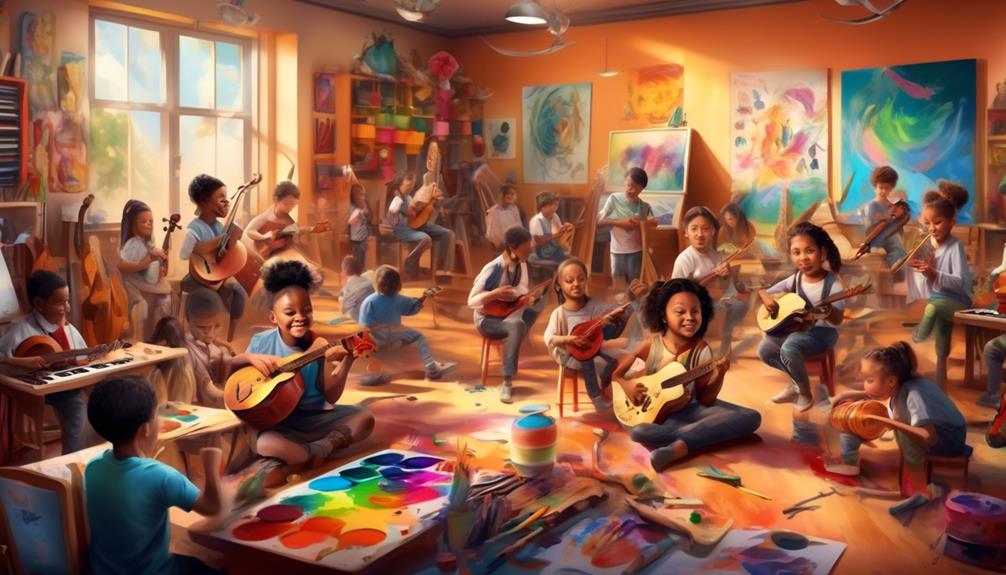Why Art and Music Are Important in Education

Art and music are important in education because they enhance cognitive abilities. They foster creativity and imagination, promoting cultural appreciation. They also improve communication and social skills and boost academic performance. Furthermore, they provide an outlet for self-expression, making students well-rounded individuals equipped to navigate the world.
Enhancing Cognitive Abilities
Enhancing your cognitive abilities is a crucial aspect of incorporating art and music into education, as it stimulates your brain, improves critical thinking skills, and fosters creativity.
Art and music have long been recognized for their ability to enhance memory and improve critical thinking skills. When you engage with art and music, your brain is stimulated and challenged in unique ways. These activities require you to analyze, interpret, and make connections, which strengthens your cognitive abilities.
Studies have shown that exposure to art and music can improve memory. When you listen to music or view a piece of art, your brain is actively processing the information, creating new neural connections. This process enhances your ability to retain and recall information, which is essential for learning and academic success.
Furthermore, engaging with art and music promotes critical thinking skills. As you analyze a painting or listen to a complex piece of music, you're encouraged to think critically, make judgments, and form opinions. These skills are transferable to various aspects of life, including problem-solving and decision-making.
Incorporating art and music into education not only enhances cognitive abilities but also fosters creativity. When you engage with art and music, you're encouraged to think outside the box, explore new ideas, and express yourself. This creativity isn't only beneficial in artistic endeavors but also in other areas of life, as it allows for innovative thinking and problem-solving.
Developing Emotional Intelligence
Now, let's talk about the importance of developing emotional intelligence through art and music.
Engaging with art can enhance empathy by allowing you to step into the shoes of others and understand their experiences.
Music, on the other hand, fosters self-expression, giving you a safe outlet to express your emotions and thoughts.
Both art and music cultivate emotional awareness, helping you to better understand and regulate your own emotions.
Enhancing Empathy Through Art
Developing emotional intelligence through art allows you to enhance your empathy and gain a deeper understanding of the feelings and experiences of others. By expressing emotions through art, you can tap into your own inner world and learn to connect with the emotions of others.
Here's how art can help you develop compassion:
- Art as a tool for self-reflection:
Through artistic expression, you can explore your own emotions and experiences, which in turn helps you develop a better understanding of yourself. This self-awareness lays the foundation for empathizing with others.
- Art allows you to express complex emotions that are difficult to put into words, enabling you to better empathize with others who may be going through similar experiences.
- Art as a bridge between experiences:
Art has the power to transcend language and cultural barriers, making it a universal means of communication. Engaging with art from different cultures and perspectives exposes you to diverse experiences, fostering empathy and understanding for others.
Fostering Self-Expression Through Music
As you continue to explore the importance of art in fostering empathy, let's now turn our attention to the powerful role that music plays in fostering self-expression and developing emotional intelligence.
Music has the ability to tap into our deepest emotions and provide a means of expression that's unique to each individual. Through music, you can collaborate with others, whether it's through playing in a band or singing in a choir. This fosters collaboration and teaches you the importance of working together towards a common goal.
Furthermore, music promotes self-discovery, allowing you to explore different styles, instruments, and genres that resonate with you personally. It provides a safe space for you to express yourself authentically and discover your own unique voice.
Cultivating Emotional Awareness
To cultivate emotional awareness and develop emotional intelligence, it's crucial to actively engage with the powerful medium of music. Music has the ability to evoke deep emotions and connect us to our inner selves. By listening to and creating music, you can promote mindfulness and develop emotional resilience in the following ways:
- Enhancing self-awareness:
- Music helps you to explore and understand your emotions, allowing you to better recognize and express them.
- Through music, you can gain insights into your own thoughts, feelings, and experiences.
- Encouraging empathy:
- Music has the power to create empathy by conveying emotions and experiences that may be different from your own.
- By listening to diverse musical genres, you can develop a greater understanding and appreciation for the emotions of others.
Fostering Creativity and Imagination
Nurture your child's boundless imagination and unleash their creative potential through the incorporation of art and music in their education. Fostering creativity and imagination is crucial for the development of innovative thinking and critical problem-solving skills. By encouraging children to explore their artistic abilities and express themselves through various forms of art and music, we're giving them the tools to think outside the box and approach challenges from different perspectives.
Art and music provide a platform for children to freely experiment, take risks, and think independently. When engaging in creative activities, they learn to think imaginatively and develop their own unique ideas. This fosters innovation, as they're constantly challenged to come up with new and inventive solutions to problems. Moreover, art and music stimulate critical thinking by encouraging children to analyze, interpret, and make judgments about the world around them. They learn to observe details, make connections, and think critically about the choices they make in their creative process.
Incorporating art and music into education also helps children develop skills such as communication, collaboration, and self-reflection. They learn to express their thoughts and emotions through artistic mediums, and they also learn to appreciate and respect different perspectives and ideas.
Promoting Cultural Appreciation and Diversity
Immerse yourself in a rich tapestry of cultures and embrace the beauty of diversity through the integration of art and music in education. By promoting cultural appreciation and diversity, art and music programs in schools provide opportunities for students to engage in meaningful cultural exchange and develop a global perspective.
Here's how these programs contribute to fostering cultural appreciation and diversity:
- Exposure to different art forms: Through art and music, students are exposed to various artistic expressions from different cultures. They can explore traditional dances, music, visual arts, and crafts, gaining a deeper understanding and appreciation for different cultural practices and traditions.
- Collaborative projects: Art and music often require collaboration and teamwork. By working on group projects, students from diverse backgrounds learn to appreciate and respect each other's perspectives, fostering a sense of unity and inclusivity.
- Cultural events and performances: Schools can organize cultural events and performances where students showcase their talents and celebrate the diversity within their community. These events provide an opportunity for students to experience different cultural traditions firsthand and develop a sense of pride in their own heritage.
- Multicultural curriculum: Incorporating art and music from various cultures into the curriculum helps create a more inclusive and diverse learning environment. By studying works of art and music from different parts of the world, students gain a broader perspective on the global human experience.
Improving Communication and Social Skills
As students engage in art and music programs that promote cultural appreciation and diversity, they also have the opportunity to enhance their communication and social skills. Participating in these activities allows students to improve their social interactions and promotes teamwork.
Through art and music, students are encouraged to express themselves creatively, which in turn helps them to develop effective communication skills. Whether it's discussing their artistic choices or collaborating with others on a musical composition, students learn how to effectively convey their ideas and listen to the perspectives of their peers. This not only improves their ability to express themselves but also fosters empathy and understanding.
In addition, art and music programs often require students to work together in groups or ensembles. This promotes teamwork and teaches students how to collaborate effectively. Whether it's painting a mural together or performing in a band, students learn the importance of cooperation, compromise, and communication within a team setting. These skills are not only valuable in the arts but also transferable to various aspects of their personal and professional lives.
To help you visualize the impact of art and music on communication and social skills, here is a table showcasing the benefits:
| Improving Communication Skills | Enhancing Social Skills | Promoting Teamwork |
|---|---|---|
| Encourages self-expression and creativity | Fosters empathy and understanding | Teaches cooperation and compromise |
| Develops effective communication skills | Enhances interpersonal connections | Promotes effective collaboration |
| Cultivates active listening skills | Builds confidence in social settings | Enhances problem-solving abilities |
Boosting Academic Performance
Are you looking for ways to boost your academic performance? Incorporating art and music into your education can have a significant impact.
Not only does it enhance cognitive development, but it also improves problem-solving skills, allowing you to approach challenges from different perspectives.
Additionally, engaging in art and music can increase your academic motivation, making you more eager to learn and excel in your studies.
Enhanced Cognitive Development
Enhanced cognitive development through art and music education can greatly improve academic performance. By engaging in artistic and musical activities, students are able to enhance critical thinking skills and promote self-reflection, leading to a deeper understanding of academic subjects.
Here's why:
- Enhancing critical thinking:
- Art and music encourage students to think creatively, problem-solve, and analyze different perspectives.
- Through artistic expression, students learn to approach challenges with an open mind and explore innovative solutions.
- Promoting self-reflection:
- Art and music provide a platform for self-expression, allowing students to explore their thoughts, emotions, and experiences.
- By engaging in these activities, students develop self-awareness, empathy, and a deeper understanding of themselves and others.
Improved Problem-Solving Skills
Improve your problem-solving skills and boost your academic performance through art and music education.
Engaging in artistic and musical activities can have a profound impact on your ability to think critically and solve problems effectively. Research has shown that students who participate in art and music programs tend to exhibit improved critical thinking and increased problem-solving abilities.
Art and music stimulate the brain in unique ways, encouraging creative thinking and providing opportunities for students to explore different perspectives and solutions. When faced with a problem, individuals with a background in art and music often approach it from multiple angles, utilizing their imagination and analytical skills to find innovative solutions.
Increased Academic Motivation
When it comes to boosting your academic performance, art and music education not only enhances problem-solving skills but also fosters increased academic motivation. Engaging in artistic and musical activities can have a profound impact on your engagement with academic material, resulting in improved learning outcomes.
Here's how art and music education can increase your academic motivation:
- Increased Engagement:
- Art and music classes provide a break from traditional academic subjects, allowing you to explore your creativity and imagination.
- Through artistic and musical expression, you can connect with the material in a more personal and meaningful way.
- Improved Learning Outcomes:
- Art and music education promote a holistic approach to learning, integrating different cognitive abilities and enhancing overall academic performance.
- By incorporating art and music into your education, you can develop a deeper understanding of concepts and improve your critical thinking skills.
Incorporating art and music into your academic journey can ignite a passion for learning and elevate your academic performance to new heights.
Providing a Outlet for Self-Expression
Art and music provide a powerful outlet for self-expression, allowing you to convey your thoughts, emotions, and experiences in a uniquely personal and impactful way. Through various artistic mediums and musical compositions, you have the opportunity to explore your inner self, embark on a journey of self-discovery, and communicate your deepest feelings without the constraints of words alone.
Engaging in art and music can have therapeutic benefits, offering a release from stress, anxiety, and other emotional burdens. It allows you to channel your energy into a creative endeavor, providing a sense of relief and catharsis. Whether it's painting, drawing, playing an instrument, or singing, the act of self-expression through art and music can be incredibly healing and rejuvenating.
Furthermore, art and music offer a safe space for you to express your authentic self, without judgment or criticism. It allows you to explore your creativity, experiment with different techniques, and embrace your unique style. By expressing yourself through art and music, you not only gain a deeper understanding of who you are, but you also develop a sense of confidence and self-acceptance.
Incorporating art and music into education provides a platform for you to express yourself freely, fostering creativity, imagination, and emotional intelligence. It encourages you to think outside the box, explore new ideas, and develop a sense of identity. By providing an outlet for self-expression, art and music empower you to communicate your innermost thoughts and emotions, enhancing your overall well-being and personal growth.
Building Confidence and Self-Esteem
Developing a strong sense of confidence and self-esteem is a crucial aspect of personal growth, and incorporating art and music into education can be a transformative way to achieve this. By engaging in artistic and musical activities, students have the opportunity to build resilience and promote teamwork, which are essential skills for success in life.
Here's how art and music can contribute to building confidence and self-esteem:
- Building Resilience
- Art and music provide a safe space for students to take risks and learn from their mistakes. When experimenting with different techniques or exploring new musical genres, students develop resilience by embracing challenges and persevering through difficulties.
- Through creative expression, students learn to accept constructive criticism and view failures as opportunities for growth. This resilience not only strengthens their artistic abilities but also prepares them to face setbacks in other areas of life.
- Promoting Teamwork
- Art and music often involve collaborative projects, where students work together to create something meaningful. This collaborative environment fosters teamwork, as students learn to communicate, compromise, and respect each other's ideas.
- By working as a team, students gain a sense of belonging and develop social skills that are invaluable in building relationships and navigating diverse environments.
Incorporating art and music into education not only enhances creativity but also cultivates confidence and self-esteem by building resilience and promoting teamwork. These skills go beyond the classroom and empower students to face challenges, collaborate effectively, and embrace their unique abilities.
Frequently Asked Questions
How Can Art and Music Enhance Problem-Solving Skills in Students?
Art and music can enhance problem-solving skills by enhancing creativity and fostering innovation. Engaging with these forms of expression encourages students to think outside the box, approach problems from different angles, and develop critical thinking skills.
What Are Some Ways That Art and Music Education Can Improve Critical Thinking Abilities?
Improving analytical skills and fostering creativity are just a couple of ways that art and music education can enhance critical thinking abilities. Let's explore how these subjects can expand your mind.
How Does Engaging in Art and Music Activities Help Students Develop Empathy and Understanding Towards Others?
Engaging in art and music activities helps you develop emotional intelligence and fosters creativity. By exploring different forms of expression, you gain a deeper understanding of others' perspectives, fostering empathy and understanding.
What Are Some Examples of How Art and Music Education Can Promote Tolerance and Acceptance of Different Cultures?
Engaging in art and music education opens your mind to different cultures, promoting cultural diversity. By immersing yourself in various art forms and music styles, you foster intercultural communication and develop a greater tolerance and acceptance of others.
Can Participating in Art and Music Classes Improve Students' Ability to Work Collaboratively With Others?
Participating in art and music classes can improve your ability to work collaboratively with others. It fosters creativity and improves communication skills, allowing you to effectively express your ideas and work together towards a common goal.










